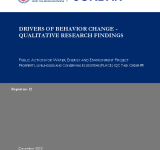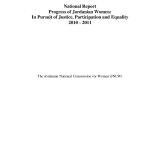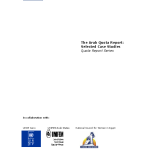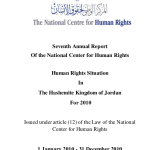The report aims to understand the outlook of Jordanians;; the key determinants of behavioral change in search for “drivers” that can be used in programs promoting conservation of water or energy and reduction of solid waste. This research was conducted as part of the Public Action for Water;; Energy and Environment Project (PAP);; which aims to encourage water and energy conservation and to support behavior change towards more conservation and efficient practices both at the household level and in the commercial;; industrial and civil society arenas using social marketing behavioral methods. It is based on the qualitative research that focuses on identifying people’s motivations;; needs and desires to help formulating social marketing programs and developing adaptive capacity in individuals and groups. Some of the key questions of the qualitative research include “What are the current coping behaviors and attitudes (psychological;; social;; etc …) of the Jordanian public (disaggregated by gender;; age;; geography and income) in the face of limited water availability and high prices for energy?;; What anticipated consequences may the Government face if stricter scenarios were imposed on water and energy? The report recommends the Ministry of Education to cooperate and introduce regular classes that focus on showing youth the direct impact of water;; energy and environment on their lives and raise awareness and consciousness of children regarding their role in the environment and influence it in a positive way.
والمواطنة
This national report is designed to trace the progress of women in various fields;; monitoring achievements;; and highlighting gaps and failures;; as well as analyzing indicators;; recommending measures;; and measuring levels of achievements in the implementation of plans and strategies. The main themes were selected according to national priorities dictated by each stage: Legal Protection for Women's Right to Access Justice;; Participation;; the Economic Empowerment of Jordanian Women;; Equality;; Citizenship and Decision-Making in Public Life. The conclusions of this report confirm that a much smaller effort was exerted at the level of providing information;; data and the provision of services in the area of providing justice and facilitating ways of achieving it. The lack of knowledge about available services among women;; whether provided by civil society organizations or government institutions;; affects women's ability to access justice negatively. Regarding the economic participation the Policies and plans that targeted empowering women economically show that the result of these policies was weak and limited. Difficulty of women’s access to job opportunities in the private sector and inequitable pay between the sexes;; lack of supporting services to working women;; including childcare Facilities;; poor matching between education outputs and skills required in the labor market and the traditional social standards that contribute to directing females towards certain professions. The report proposed general recommendations and directions that include quick solutions to deal with the main highlighted challenges.
This report was compiled from the findings and case studies presented at a workshop held on 5-6 December 2004;; in Cairo Egypt. This report contains an overview on global trends and regional analyses;; implementing legislated quotas for women;; quota adopted by political parties;; methods on enhance women’s participation;; and the role of the international community and international instruments. The international IDEA had convened a series of regional workshops to gather qualitative data. The report also has 6 case studies about women’s participation and quota include comparative experiences with quotas;; address the culture challenges to women’s representation in the Arab world;; and point the opportunities that could be seized in order to meet those challenges.
This annual report comes to diagnose the situation of human rights in the Hashemite Kingdom of Jordan in 2010;; and to point out the positive or negative changes that have occurred during that period. The report comprises the outcome of the accumulated experiences of the Center in the field of protecting civil;; political;; economic;; social and cultural rights. It also comprises a qualitative addition represented in the devotion of an axis related to the assessment of how serious the Government is in taking appropriate legislative;; judicial and executive measures needed to implement the recommendations by the treaty committees. The main themes are: Civil and Political Rights;; Economic;; Social and Cultural Rights;; Women's Rights;; Child Rights;; Rights of Persons with Disability;; Rights of the Elderly. The report proposes legislations;; policies and measures that are believed to contribute to changing the current situation of Human Rights for the better;; especially in the light of the rapid developments taking place in the Arab region.



